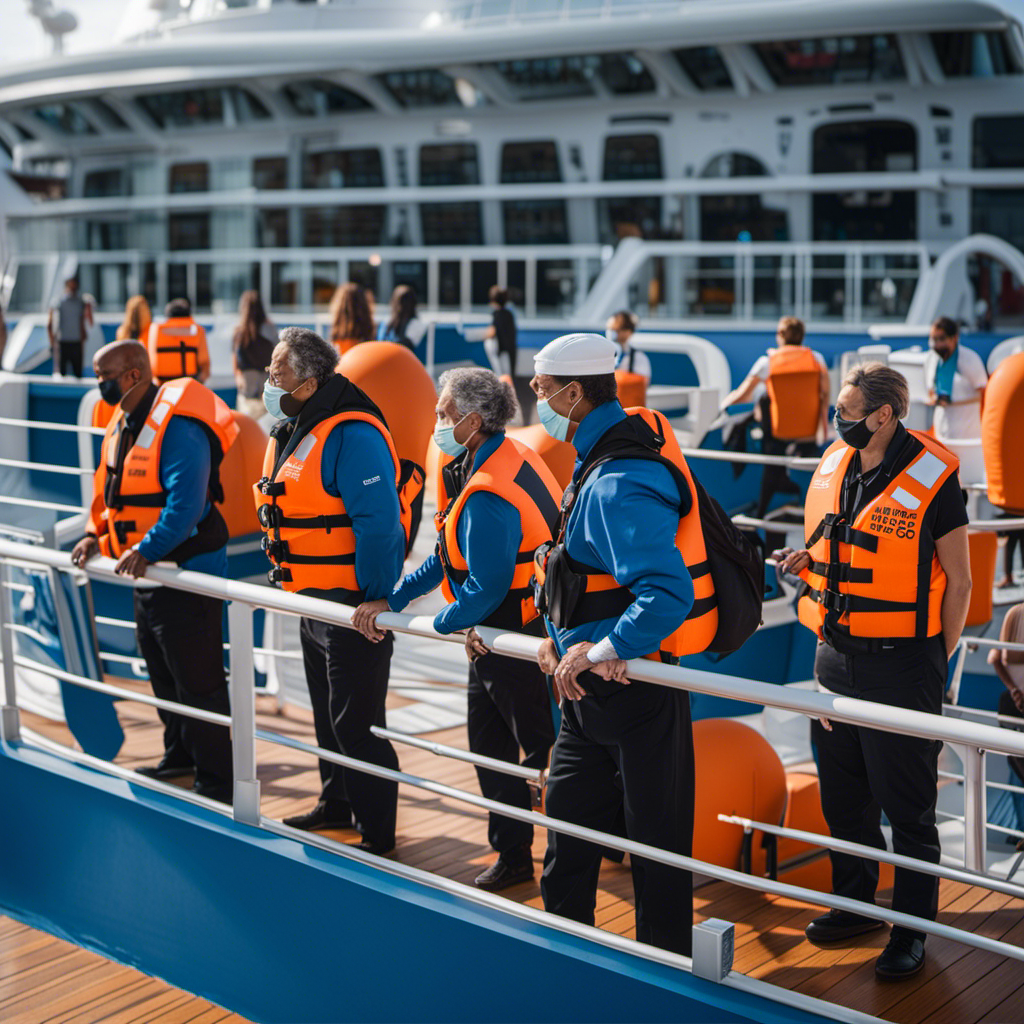As someone passionate about cruising, I’m excited to share the latest guidelines from the CDC on simulated cruises.
These guidelines aim to ensure the safety of passengers and crew members by testing a cruise ship’s ability to mitigate the spread of COVID-19.
To conduct a simulated cruise, cruise lines must obtain approval from the CDC, have written agreements with ports and local health authorities, and maintain hygiene and social distancing protocols.
The CDC is also welcoming public comments on these guidelines, reflecting their commitment to transparency and public input.
Key Takeaways
- CDC requires cruise lines to obtain approval at least 30 days prior to the sail date and have written agreements with ports and local health authorities.
- Cruise lines must share risks with volunteer passengers through written notification and obtain informed consent from all volunteers.
- Eligibility for conducting a simulated voyage requires a complete and accurate restart plan, submission of an Enhanced Data Collection form, and adherence to the No Sail Order response plan.
- Volunteers must make up at least 10% of the maximum capacity, be informed about CDC’s Travel Health Notice for COVID-19, and be at least eighteen years old. Verification of vaccination status or medical condition is also required.
Eligibility for Conducting a Simulated Voyage
I need to make sure my plan for restarting includes all the necessary elements and that I submit the required forms and test results to be eligible for conducting a simulated voyage.
According to the CDC eligibility guidelines, there are specific requirements that must be met. Firstly, the plan for restart must be complete and accurate. This includes submitting the Enhanced Data Collection form as specified and following all elements of the No Sail Order response plan.
Additionally, laboratory test results for crew members must be submitted, and crew transfers and land-based embarking crew must meet the necessary requirements. These simulated sailing requirements are put in place to ensure the safety and well-being of all participants.
Requirements for Volunteers
To be eligible for participation, volunteer passengers must be at least eighteen years old and their vaccination status or medical condition must be verified. This requirement ensures the safety and well-being of all individuals onboard.
The CDC guidelines outline specific requirements for volunteers, which include:
-
Volunteer capacity: The minimum number of volunteer passengers must be at least 10% of the maximum capacity of the ship. This ensures that there are an adequate number of participants to conduct a meaningful simulated voyage.
-
Vaccination verification: All volunteer passengers must have their vaccination status or medical condition verified. This step is crucial in mitigating the risk of COVID-19 transmission during the simulated cruise.
-
CDC’s Travel Health Notice: Volunteer passengers must be advised of the CDC’s Travel Health Notice for COVID-19. This ensures that they are fully informed of the potential risks and can make an informed decision about participating.
Requirements Relating to the General Components of Simulated Activities
Maintaining a list of all participants in the simulated voyage is an important component of ensuring the effectiveness and safety of the activities. Following CDC guidelines for simulated voyage activities is crucial for cruise lines to resume operations amidst the COVID-19 pandemic. These guidelines include conducting at least one simulation for each ship, including all U.S. ports if applicable, and ensuring that simulated voyages are 2-7 days in length with at least one overnight stay. Hand hygiene, face mask, and social distancing protocols must also be followed to minimize the risk of COVID-19 transmission. To convey a deeper understanding of these requirements, here is a table summarizing the key components:
| CDC Guidelines for Simulated Voyage Activities | ||
|---|---|---|
| Conduct simulations for each ship | Include all U.S. ports if applicable | Simulated voyages must be 2-7 days in length with at least one overnight stay |
| Follow hand hygiene protocols | Adhere to face mask requirements | Maintain social distancing measures |
The Silver Lining
Exempting cruise lines from other requirements, the vaccination requirement has provided a silver lining for the industry amidst the COVID-19 pandemic. With the aim of making vaccines mandatory, the CDC’s guidelines have brought hope to cruise line executives.
While alternative options can be frustrating, the vaccination requirement ensures a safer environment for passengers and crew members. This exemption allows cruise lines to focus on implementing other necessary protocols, such as hand hygiene, face mask usage, and social distancing.
The prospect of mandatory vaccines for cruising aligns with the broader efforts to control the spread of the virus and protect public health. As more individuals receive vaccinations worldwide, the industry can see a gradual return to normalcy, allowing passengers to enjoy their cruise experiences with greater peace of mind.
Share Your Opinions
As a cruise enthusiast, I believe it’s important to share our opinions on the CDC’s guidelines for simulated voyages in the comments section.
These guidelines have both pros and cons and will have a significant impact on the cruise industry.
On the positive side, the guidelines provide a roadmap for cruise lines to resume operations safely. They require thorough planning, risk assessment, and informed consent from volunteer passengers. The guidelines also prioritize the vaccination of passengers, which can help prevent outbreaks on board.
However, there are concerns about the feasibility and effectiveness of these simulated voyages. Some argue that they are unnecessary and costly, considering the progress made with vaccinations. Additionally, the guidelines may prolong the suspension of cruises and further harm the industry.
It is crucial for cruise enthusiasts and industry stakeholders to voice their opinions on these guidelines to ensure a balanced and practical approach to restarting cruising.
Frequently Asked Questions
How Long Does a Simulated Voyage Need to Be?
For a simulated voyage, the length requirements may vary, but it typically needs to be between 2-7 days with at least one overnight stay. These measures ensure proper testing of safety protocols and passenger experience.
Are There Any Age Restrictions for Volunteer Passengers?
Yes, there are age restrictions for volunteer passengers. They must be at least eighteen years old. Volunteer qualifications, such as vaccination status or medical condition, should also be verified.
Can Cruise Lines Choose to Not Require Vaccines for Simulated Cruises?
Yes, cruise lines can choose to not require vaccines for simulated cruises. However, they must follow the health screening process outlined by the CDC and ensure the safety of all passengers and crew.
Is There a Minimum Number of Crew Members Required for a Simulated Voyage?
Yes, there is a minimum number of crew members required for a simulated voyage. The crew member capacity should be sufficient to effectively simulate the operations and activities of a typical cruise. Crew member qualifications must also meet the necessary standards.
Are There Any Specific Guidelines for On-Board Entertainment and Activities During a Simulated Cruise?
As a cruise enthusiast, I can say that on-board entertainment options during a simulated cruise must adhere to safety protocols. These protocols ensure the well-being of passengers and include measures such as enhanced sanitation, social distancing, and limited capacity for activities.
Conclusion
In conclusion, the CDC’s guidelines for simulated cruises aim to ensure the safe resumption of cruise ship operations amidst the ongoing COVID-19 pandemic. These guidelines prioritize mitigating the spread of the virus and protecting the health of passengers and crew members.
While these guidelines have sparked frustration among cruise line executives, they recognize the importance of prioritizing public health over economic considerations.
One interesting statistic to note is that the CDC has received over 800 public comments regarding these guidelines, reflecting the significant interest and engagement of the public in this matter. This demonstrates the importance of public input in shaping the future of cruise ship operations.










